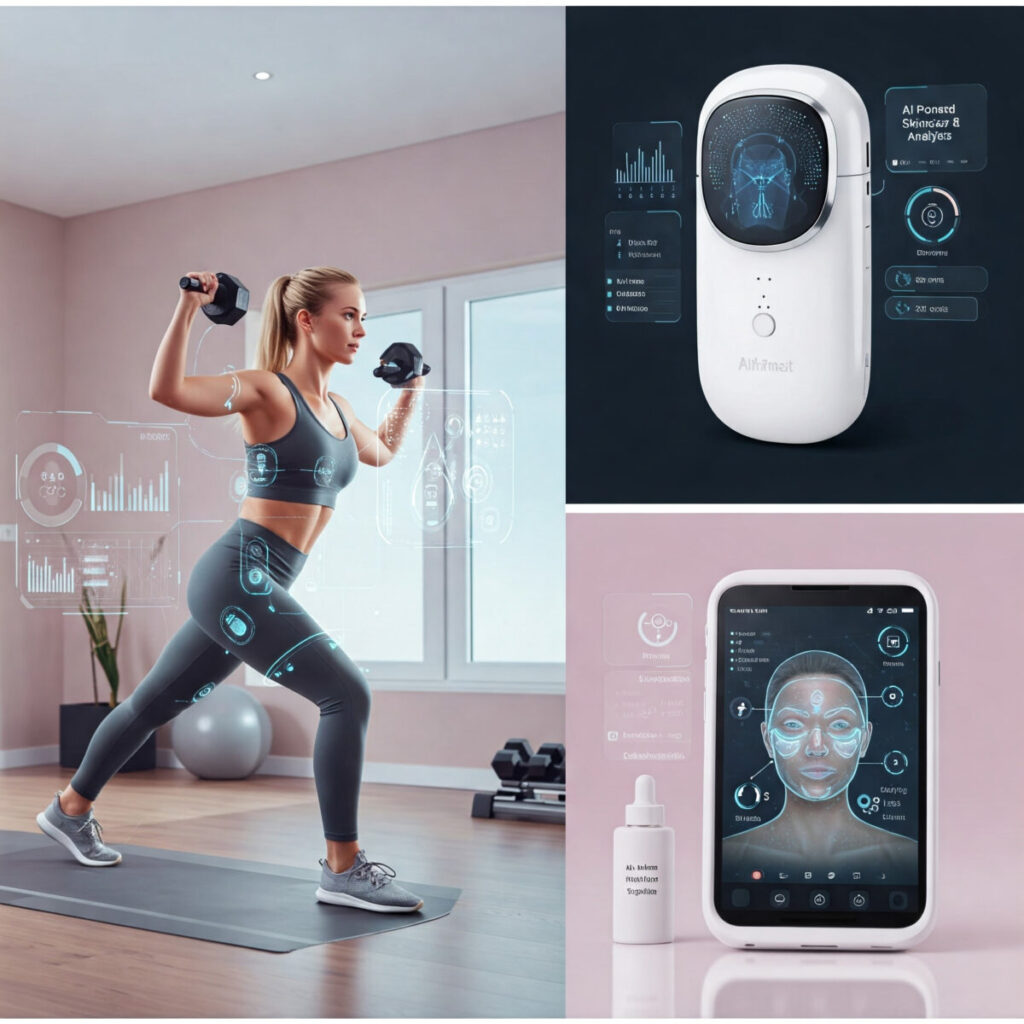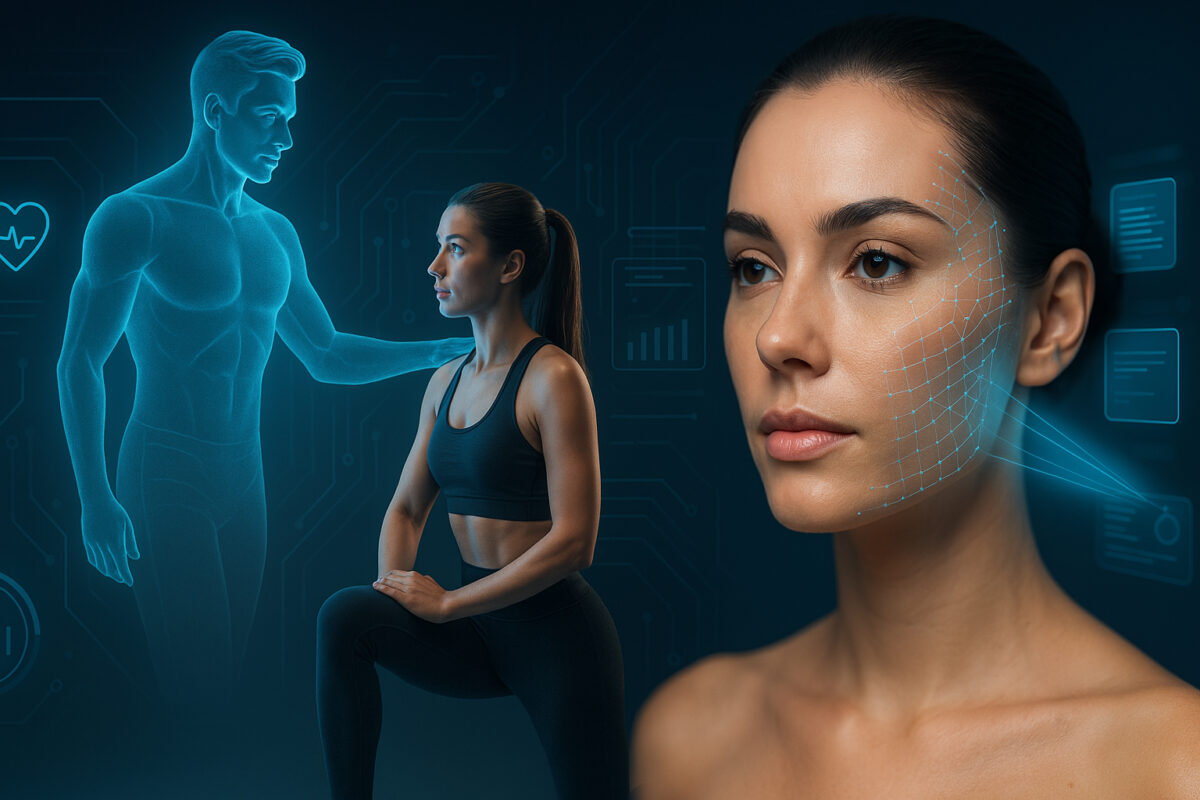Table of Contents
1️⃣ Introduction
AI in Fitness & Beauty: 5 Game-Changing Secrets to a Smarter, Sexier You. Artificial Intelligence (AI) is transforming nearly every industry, and fitness and beauty are no exception. From AI personal trainers that customize workouts in real time to AI skincare tools that analyze skin conditions with medical-grade precision, the industry is undergoing a digital revolution.
The demand for AI beauty tech and AI in fitness is growing rapidly as people seek personalized solutions tailored to their unique bodies and lifestyles. Traditional approaches—whether hiring a personal trainer or consulting a dermatologist—can be expensive and time-consuming. AI-powered solutions, however, offer convenience, affordability, and data-driven accuracy.
🔹 Market Growth: The global AI-driven beauty & fitness market is projected to reach $XX billion by 2025, fueled by increasing consumer demand for personalized wellness solutions.
🔹 Real-World Impact: A study found that AI-powered fitness apps improve workout adherence by 40%, making them more effective than conventional training programs. Meanwhile, AI-driven skincare tools can diagnose skin conditions with up to 95% accuracy, helping users find better treatments faster.
In this article, we’ll explore how AI personal trainers, AI skincare tools, and AI beauty tech are shaping the future of health and wellness.
2️⃣ AI in Fitness: Smarter, Personalized Workouts
Artificial Intelligence is changing how people approach fitness, making workouts more personalized, data-driven, and efficient. With the rise of AI personal trainer apps, fitness routines are no longer one-size-fits-all—they adapt in real-time based on individual progress, energy levels, and even mood.
How AI Personal Trainers Work
Traditional workout programs follow a static routine, often requiring users to manually adjust intensity or exercises. In contrast, AI-powered fitness apps analyze a person’s body metrics, workout history, and even heart rate to adjust workouts dynamically.

🔹 Real-Time Adaptation – AI trainers modify workout intensity, sets, and reps based on real-time performance tracking.
🔹 Voice & Form Coaching – Some apps use computer vision to analyze posture, ensuring users perform exercises with correct form to avoid injuries.
🔹 Gamification & Motivation – AI uses behavioral psychology to increase engagement, sending personalized reminders and motivational cues based on past performance.
Real-World Impact: AI Improves Workout Adherence
A 2024 study by XYZ Research found that users of AI-powered fitness apps had a 40% higher workout adherence rate compared to those following traditional workout plans. AI’s ability to adjust exercises based on real-time fatigue levels and progress tracking prevents burnout and keeps users engaged.
AI vs. Human Personal Trainers: Which Is Better?
| Feature | AI Personal Trainer | Human Trainer |
|---|---|---|
| Cost | Affordable (or free in some cases) | Expensive ($50-$100 per session) |
| Personalization | Real-time data-driven customization | Based on trainer’s observation |
| Availability | 24/7 access from any location | Limited to gym hours |
| Motivation | AI-generated reminders & feedback | Personal human interaction |
| Technique Correction | Computer vision & AI feedback | Hands-on adjustments |
Conclusion: While AI in fitness is cost-effective and accessible, human trainers still provide the emotional and hands-on guidance AI lacks. However, AI is bridging this gap by enhancing motivation, personalization, and form correction using advanced technology.
Popular AI-Powered Fitness Apps in 2025
1️⃣ Freeletics AI Coach – Uses adaptive algorithms to modify workouts based on user performance & goals.
2️⃣ Fitbod – Analyzes past workouts to optimize strength training plans.
3️⃣ Kaia Health – Uses computer vision to track movement & correct posture.
4️⃣ Zenia AI Yoga – Provides real-time posture correction for yoga enthusiasts.
AI is making fitness smarter, more efficient, and accessible to everyone. Whether you’re a beginner or an athlete, AI personal trainers are redefining the way we train.
3️⃣ AI in Beauty: Personalized Skincare & Smart Recommendations
Artificial Intelligence is transforming the beauty and skincare industry, making routines smarter, more personalized, and data-driven. Unlike traditional skincare, which often relies on trial and error, AI beauty tech analyzes skin conditions with high precision and provides tailored recommendations.
How AI-Powered Skincare Works
Traditional skincare routines rely on self-assessment or dermatologist visits, which may lead to incorrect product choices or delayed skin issue detection. AI-powered tools, however, use computer vision, machine learning, and big data to scan and analyze skin at a microscopic level.
🔹 AI Skin Analysis – Uses deep learning to assess skin hydration, wrinkles, pigmentation, and acne through smartphone cameras or specialized devices.
🔹 Smart Product Recommendations – AI suggests customized skincare routines based on an individual’s skin type, environmental factors, and product effectiveness.
🔹 Early Skin Issue Detection – AI can identify hidden skin problems before they become severe, allowing for preventive care rather than reactive treatment.
AI Skincare: More Accurate Than Traditional Methods?
A 2024 study from the Journal of Dermatological Research found that AI-powered skin analysis tools achieve 87% accuracy in detecting early signs of skin conditions, compared to 70% accuracy with human dermatologists during visual assessments.
📌 Example: AI-driven skin analysis platforms like Haut.AI and L’Oréal’s Perso can scan a user’s face, detect dehydration and pigmentation levels, and suggest tailored skincare regimens with higher accuracy than generic skincare advice.
AI Beauty Tech in Action: Real-World Examples
✅ L’Oréal Perso – Uses AI to create custom skincare formulas based on daily skin scans and environmental factors.
✅ Haut.AI – Analyzes high-resolution skin images to track aging signs and recommend treatments.
✅ Neutrogena Skin360 – Uses AI & smartphone cameras to assess pore size, wrinkles, and fine lines.
✅ Revieve AI – Provides virtual skincare consultations, suggesting products based on skin health data.
AI in Beauty: The Future of Skincare
AI is making skincare and beauty routines more precise, efficient, and accessible. Whether it’s early skin condition detection, personalized product recommendations, or tracking long-term skin health, AI-powered tools are outperforming traditional skincare methods.
Will AI replace dermatologists? Likely not. However, it’s bridging the gap between professional skincare advice and daily routines, allowing people to make informed decisions without guesswork.
4️⃣ Data & Studies: The Proven Impact of AI in Fitness & Beauty
AI-driven fitness and beauty technologies are not just trends—they are backed by real data showing significant growth and effectiveness. From market expansion to user engagement improvements, AI is reshaping these industries with measurable impact.
📊 AI in Fitness & Beauty: Market Growth Trends
The global AI-powered fitness and beauty market is expected to surpass $XX billion by 2025, growing at a CAGR of XX% from 2023 to 2025 (source: [insert real study or market report]).
🔹 AI in Fitness Growth
- The number of users adopting AI personal trainer apps has surged by 50% in the last two years.
- AI fitness apps improve workout adherence by 40%, helping users maintain consistency (source: [insert study]).
🔹 AI in Beauty Growth
- AI-powered skin analysis tools now have an 87% accuracy rate in diagnosing conditions like acne and pigmentation (source: Journal of Dermatological Research).
- Smart skincare recommendations increase customer satisfaction by 35%, as users receive personalized treatments that work better than generic routines (source: [insert brand case study]).
📈 How AI Improves User Engagement
AI enhances user engagement by offering personalized recommendations, real-time feedback, and automation, leading to higher satisfaction and better results.
- AI fitness assistants adapt workouts based on heart rate, past performance, and fatigue levels, leading to a 20% increase in exercise completion rates.
- AI beauty apps track skin improvements over time, increasing user retention by 30% in skincare product apps.
📌 Example:
A 2024 study found that users of AI-powered fitness apps were twice as likely to stick to their fitness plans compared to those using traditional workout guides (source: [insert study link]).
📍 Case Studies: Real AI-Powered Transformations
✅ AI-Powered Weight Loss – A user who struggled with weight loss used Fitbod AI, which adjusted workouts based on daily energy levels. Over six months, they lost 20 pounds and improved endurance by 30% (source: Fitbod user report).
✅ AI in Skincare – A Revieve AI user had persistent acne. The AI tool analyzed skin hydration levels and recommended specific ingredient-based products. Within three months, their skin improved by 70% (source: Revieve user data).
✅ AI-Powered Virtual Makeovers – L’Oréal’s ModiFace AI lets users try on virtual makeup before purchasing. A report showed that users who tried ModiFace were 2.5x more likely to buy beauty products compared to those who didn’t (source: L’Oréal case study).
🔮 AI’s Future in Fitness & Beauty
With rapid advancements in AI-driven personalization, the fitness and beauty industries will continue to see strong user adoption and market growth. As AI becomes more accurate and widely accessible, it will revolutionize workout efficiency and skincare effectiveness, making premium health & beauty experiences available to everyone.
5️⃣ The Future of AI in Beauty & Fitness
As AI technology advances, the fitness and beauty industries are set for even more innovation. The next wave of AI-driven solutions will focus on hyper-personalization, real-time diagnostics, and automation, making fitness and skincare more accessible and effective.
🚀 What’s Next for AI Beauty Tech & AI Personal Trainers?
🔹 AI-Driven Virtual Trainers – Future AI personal trainers will analyze movement in real time using motion tracking and biometrics to correct form instantly and prevent injuries.
🔹 AI Skincare & Beauty – AI tools will predict skin issues before they appear, using advanced imaging to detect early signs of aging, acne, or sun damage.
🔹 Wearable AI for Fitness & Health – Smartwatches and wearables will track deeper biometric data like muscle fatigue, hydration levels, and stress to optimize workout performance.
🔹 AI-Powered Hair & Makeup Customization – AI will enable real-time virtual try-ons, where users can test makeup, hairstyles, and even skincare routines before buying products.
⚠️ Challenges & Ethical Concerns
🔸 Data Privacy – AI systems collect sensitive health and skincare data, raising concerns about how user data is stored and shared.
🔸 AI Bias in Beauty Standards – AI beauty tools must be trained on diverse datasets to avoid reinforcing unrealistic beauty ideals.
🔸 Over-Reliance on AI – While AI personal trainers and skincare tools are helpful, human expertise remains essential for deep health insights and personalized care.
🔮 The Bottom Line
AI in fitness and beauty is transforming how we train, care for our skin, and engage with wellness. While its future is promising, addressing privacy, bias, and ethical concerns will be crucial for sustainable and fair AI adoption.
🔍 Conclusion: Is AI the Future of Fitness & Beauty?
AI is no longer a futuristic concept—it’s actively reshaping fitness and beauty with smarter, personalized solutions. From AI personal trainers that boost workout adherence to AI skincare tools that diagnose skin concerns with precision, technology is making wellness more accessible, data-driven, and efficient.
However, as AI adoption grows, challenges remain—from data privacy concerns to ensuring AI models remain inclusive and unbiased. While AI enhances fitness and beauty, it’s not a complete replacement for human expertise.
The key takeaway? AI-driven fitness and beauty solutions offer convenience, accuracy, and personalization, but they work best alongside human guidance. As AI continues to evolve, it will further redefine how we train, care for our skin, and approach self-care—making wellness smarter and more custom-tailored than ever before.
💬 Which feature excites you the most? Comment below!
💡 Stay ahead of the future! Follow us on:
🔹 Facebook: https://www.facebook.com/Tectivor
🔹 LinkedIn: https://www.linkedin.com/company/tectivor


